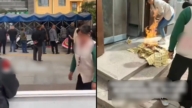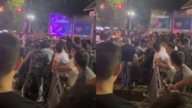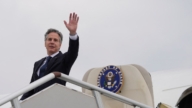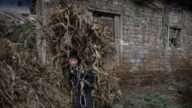【新唐人2011年10月22日訊】「歷史不是靠回憶及傳說,而是靠真實材料來講話。」這是台灣國史館館長呂芳上說的一句話。台灣國史館與軍情局合作,依據民國政府的軍統祖師爺戴笠的手稿,出版「戴笠史料」,內容全部是戴笠在抗戰期間的情報手稿彙編而成,他們希望這些史料能把真實還給歷史。
曾被視為「最高機密」的戴笠史料與軍情檔案,首先出版的是「軍情戰報」、「經濟作戰」、「忠義救國軍」。台灣國防部軍情局長湯家伸在為史料彙編寫序時強調,大陸坊間近年出版許多國共時期情報工作及戴笠的書冊,大部分是以作者單方面的立場闡述,許多扭曲與不實,應適時公布相關資料,以完善軍情局史。
負責戴笠史料整理的台灣國史館研究員吳淑鳳表示,一個情報機關願意主動開放檔案,像徵民主觀念向前一步。
台灣國史館研究員吳淑鳳:「這件事情,我覺得像徵的是民主觀念的升華,既使是一個情報的機密機關,他們現在也願意接受歷史的評價。」
過去情報工作被神話或被醜化,現在藉由檔案的公開,可以還原情報人員的真實面貌。「忠義救國軍」就是這個例子,這支軍隊在當時被中共說成是土匪軍隊。
台灣國史館研究員吳淑鳳:「他是一個游擊部隊,並不像大陸方面所宣傳的,說他是一個烏合之眾,說他是一個土匪的軍隊,其實他不是,他是一個有組織的一個部隊,然後對於當時,在整個江南地區的敵後游擊戰是有貢獻的,這個可以從檔案上面可以看的出來。」
吳淑鳳說,戴笠當時提倡忠義救國這樣一個精神,所以他要強調團體及家庭,同志如手足的一種傳統。同時也像徵情報單位對領袖忠貞的一個傳統。
而長期以來,在中共的宣傳中,「中美合作所」被定性為反共、反人民而建立的法西斯集中營,幾乎成了所謂「美蔣罪行」的代名詞。
「戴笠史料」有關「中美合作所的成立」、「中美合作所的業務」及「軍統局隸屬組織機構」等三冊,預計在12月出版。
台灣國史館研究員吳淑鳳:「中美合作所的位址是在歌樂山,好像是大陸《紅巖》、一些宣傳品提到,那個是虐待中共戰俘的一個地方,那事實上,你從檔案上去看的時候,﹙就是﹚中美合作所派過來的人員所居住的地方,是他們工作的一個場所。至於機構本身,它也不隸屬軍統局,所以它也不是為軍統局而服務的,所以這個是可以比較明確的一個區別的。」
在大陸生活將近四十年的史學家蘇明表示,利用御用文人妖魔化敵對的一方,這是共產黨慣用的意識型態。
前北京大學教授蘇明:「大陸曾經共黨支使御用文人寫了一部小說,叫做」《紅巖》,在這裡邊就是整個開始整個詆譭、妖魔化、醜化當初的中美合作所,在這裡邊就寫到了,所謂這個共黨的一幫英雄們,曾經是被抓了關在這裡邊,如何受到甚麼樣的毒刑,受過美國的48套的毒刑,這裡面戴笠就是直接的負責人。」
吳淑鳳認為,台灣軍情局希望在辛亥革命百年時,對早年的情報歷史做定位。吳淑鳳說他們無意替戴笠說話,但作為軍情組織,戴笠1938年一手建立的軍統局,在抗日戰爭時期的敵後諜報搜查以及中美情報合作方面,對於戰爭的勝利有著無可抹滅的貢獻。
新唐人記者梁欣、黃容、薛莉採訪報導。
Dai Li’s Manuscript Published
“History does not depend on memories and legends, but real material,"
said Lu Fangshang, Taiwan’s National History curator.
Taiwan’s military intelligence, working in conjunction with
the Academia Historica, published Dai Li’s Historical Materials,
which is based on a manuscript written by Dai Li,
the founder of the Bureau of Investigation and Statistics
of the Military Council of the KMT government.
All of the content is based on Dai Li’s intelligence material
which was gathered during the war, in the hopes of revealing the true history of China to the public.
Dai Li’s historical and military archives were once regarded as
Top Secret.
The first Chinese Communist Party (CCP) military publications,
including the Military Battlefield Report, the Economic War,
and the Loyalty and patriotism national salvation forces
were written from a very subjective point of view.
Thus, Tang Jiashen, the director of the Intelligence Department of
Taiwan’s Ministry of Defense,
emphasized to the CCP that much of its military history is incomplete
and not based on facts.
Tang said the CCP should support its so-called historical
military facts with solid evidence, including Dai Li’s books.
Researcher Wu Shufeng of the Taiwan National History
Institute, is in charge of compiling research materials.
She said that when an intelligence agency is willing
to publicize its archives, it symbolizes a big step forward in the direction of democracy.
Wu Shufeng: “This symbolizes a shift towards democracy.
Even a secret intelligence agency is now willing to accept
the true account of history."
Intelligence work was either glorified or hated in the past.
But by publishing true archives of China’s military history,
people will finally know the true facts.
Take the Loyalty Salvation Army, as an example.
The CCP referred to it as a “bandit army,” when it was not.
Wu: “It was a organized guerrilla force that worked
behind enemy lines in the southern region of China and not a bandit army as the CCP claims.
This can be proven via historical archives."
Wu said Dai Li promoted the spirit of loyalty to the country,
so he emphasized community, family, and treating coworkers as brothers.
He also emphasized the tradition of showing loyalty to
intelligence officers.
For a long time, the CCP’s propaganda and
its Sino-US cooperation has been characterized as “anti-communist,”
anti-people fascist concentration camps,
almost become synonymous of so-called 『US-Chiang crime’.
Dai Li’s historical archives detailing the establishment of Sino-U.S.
cooperation, Sino-U.S. Business cooperation,
and the Organization Structure of Intelligence Bureau,
are expected to be published in December.
Wu: “Sino-US cooperation is at Geleshan.
Red Rock, a mainland China book and some propaganda videos,
mentions that Geleshan is the place where CCP prisoners were abused.
Actually from archives, it was said to be a residence for workers
of the Sino-U.S. cooperation, and a working place.
The institution itself was not attached to the Bureau of Investigation
and Statistics, and did not serve the Bureau.
So there is a relatively clear distinction, here."
Historian, Su Ming, had lived in mainland China
for about 40 years.
He said that the CCP used ordained scholars to demonize
the opposing party.
This is a common Communist tactic.
Su Ming, a former professor at Peking University: “The CCP
had once sought support for the mainland,
thus it asked an ordained scholar to write the novel, Red Rock,
in which the original Sino-U.S. cooperation was slandered, demonized, and vilified.
In the novel, the so-called CCP heroes were arrested, detained
and tortured using 48 methods recognized by the United States, while Dai Li personally oversaw things.”
Wu believes that Taiwan’s Military Intelligence Bureau hopes
to make known its intelligence history during the upcoming100th anniversary of the 1911 Revolution.
Wu said they have no intention of speaking on Dai Li’s behalf.
But as a military intelligence bureau, which Dai Li created
in 1938,
it has been incredibly invaluable in securing military
intelligence data behind enemy lines,
Sino-U.S. intelligence cooperation,
and details on how the war was won.
NTD reporters Liang Xin, Huang Rong and Xue Li



























